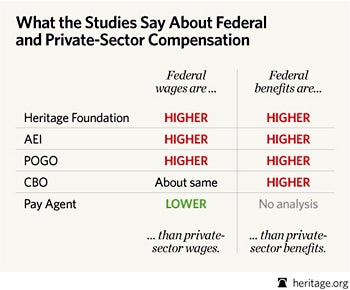Yes, Federal Workers Are Overpaid
William Beach /
The Government Accountability Office’s (GAO) report last week on federal and private-sector compensation showed that four recent studies agree: Federal compensation is higher than the private sector’s.
Unlike the recent CBO paper on the same topic, the GAO did not crunch its own numbers or come to any firm conclusions. Instead, the watchdog agency summarized six recent studies that have addressed the issue, highlighting the methodological differences in each.
The Heritage Foundation is well represented in the GAO study. In fact, two of my Heritage colleagues and a long-time associate at the American Enterprise Institute (AEI) made the GAO’s list. Heritage senior policy analyst James Sherk’s study was included among the six, as was a separate report for AEI coauthored by Heritage’s Jason Richwine and AEI’s Andrew Biggs.
Readers interested in comparing methodological details across studies should take a look at both the GAO report itself and this Backgrounder contrasting the Heritage, AEI, and CBO reports.
That said, I want to draw your attention to how the media reacted to the GAO report. The takeaway from the report has often been depicted by news sources as something like: “All these studies give different answers, so we just don’t know how federal pay stacks up.” Or: “All of the studies have limitations of some kind, so we shouldn’t trust any of them.”
Is that really the best interpretation? Let’s compare the results of the five studies that attempted apples-to-apples comparisons by matching workers or jobs between sectors. These are the aforementioned AEI, Heritage, and CBO studies, a report by the Project on Government Oversight (POGO), and the federal government’s official annual wage comparison conducted by the President’s “Pay Agent.”
Here are the results, separated between wages and benefits:
- Heritage: federal wages higher than private sector, federal benefits higher than private sector;
- AEI: federal wages higher than private sector, federal benefits higher than private sector;
- POGO: federal wages higher than private sector, federal benefits higher than private sector;
- CBO: federal wages about even with private sector, federal benefits higher than private sector;
- Pay Agent: federal wages lower than private sector, no analysis of benefits.
In summary, four of the five studies find that total federal compensation is higher than private-sector compensation. The fifth study (the Pay Agent report) cannot come to any conclusion because it does not consider benefits. So all of the studies reviewed by GAO that actually reached a conclusion found that federal workers are overcompensated. The wage penalty reported by the Pay Agent might be enough to outweigh the benefits premium that it didn’t look for—but we don’t know.
So when not a single study has yet even claimed to overturn the basic conclusion drawn by Heritage, AEI, POGO, and the CBO, one would think the media would sound less discouraged about ever getting a definitive answer to the federal pay question. One would think.

